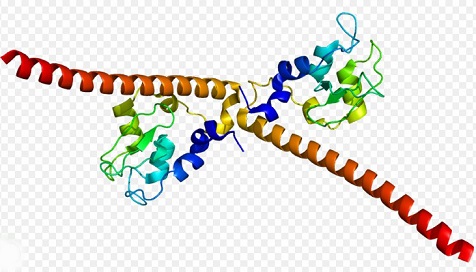Survivin Can Help In Preventing White Blood Cell Apoptosis And Improve Outcomes In COVID-19
Nikhil Prasad Fact checked by:Thailand Medical News Team May 13, 2024 11 months, 1 week, 6 days, 7 hours, 13 minutes ago
COVID-19 News: COVID-19, caused by the SARS-CoV-2 virus, has brought about a global health crisis, prompting extensive research into understanding its pathogenic mechanisms and developing effective treatments. Among these mechanisms, apoptosis, the programmed cell death essential for maintaining cellular balance, has gained significant attention.
COVID-19 News report delves into the intricate dynamics of apoptosis in COVID-19 patients, focusing on how survivin, an apoptosis inhibitor, may offer therapeutic potential.
 The Molecular Representation Of The Protein Survivin
What is Survivin
The Molecular Representation Of The Protein Survivin
What is Survivin
Survivin, alternatively known as baculoviral inhibitor of apoptosis repeat-containing 5 or BIRC5, represents a vital protein encoded by the BIRC5 gene in humans. Belonging to the inhibitor of apoptosis (IAP) family, survivin plays a crucial role in inhibiting caspase activation, thereby exerting a negative influence on apoptosis or programmed cell death. Studies have demonstrated that disrupting survivin induction pathways leads to an increase in apoptosis and a reduction in tumor growth, highlighting its significance in cancer biology. Notably, survivin exhibits high expression levels in human tumors and fetal tissue, contrasting with its absence in terminally differentiated cells. This distinct pattern of expression suggests that survivin could serve as a promising target for cancer therapy, capable of distinguishing between transformed and normal cells.
Furthermore, survivin expression undergoes tight regulation throughout the cell cycle, predominantly manifesting in the G2-M phase. During mitosis, survivin localizes to the mitotic spindle through interactions with tubulin, potentially contributing to the regulation of mitotic processes. While the precise molecular mechanisms governing survivin regulation remain incompletely understood, there are indications of its association with the p53 protein. Additionally, survivin emerges as a direct target gene of the Wnt pathway, with upregulation facilitated by beta-catenin signaling. These regulatory pathways underscore the intricate control mechanisms that govern survivin's functions within cellular processes.
Understanding Apoptosis in Viral Infections
Apoptosis, a fundamental process in cellular biology, plays a pivotal role in responding to viral infections. Various viruses, including hepatitis C virus (HCV), reoviruses, Severe Acute Respiratory Syndrome (SARS), and Human Immunodeficiency Virus (HIV), manipulate apoptosis to modulate host responses and facilitate their replication. However, the specific interplay between apoptosis and proliferation rates in COVID-19 patients remains a relatively unexplored area.
Examining Apoptosis and Proliferation in COVID-19 Patients
A recent study conducted by researchers from Prince Sattam bin Abdulaziz University (PSAU)-Saudi Arabia, aimed to bridge this gap by analyzing apoptosis and proliferation rates in individuals infected with SARS-CoV-2, both pre- and post-vaccination, compared to healthy controls. The study involved assessing peripheral blood cells, particular
ly white blood cells (WBCs), to unravel the implications of apoptosis in COVID-19 pathogenesis and therapeutic interventions.
Findings: Apoptosis and Proliferation Dynamics in COVID-19
The study's results revealed a significant increase in apoptosis levels in fresh lymphocytes and granulocytes from COVID-19 patients compared to healthy donors. This heightened apoptosis, coupled with increased proliferation rates in lung epithelial cells, underscores the complex immune response elicited by the virus. Furthermore, elevated levels of soluble Fas ligand (sFasL) and the pro-inflammatory cytokine IL-38 in COVID-19 patients suggest immune dysregulation contributing to disease severity.
Survivin's Protective Role: Insights from the Study
Notably, individuals who received the COVID-19 vaccine or recovered from the infection exhibited higher survivin levels. Survivin, detected through immunohistochemistry and ELISA, emerged as a potential protective factor against excessive WBC apoptosis, thereby mitigating lung damage and improving clinical outcomes.
Implications for COVID-19 Treatment Strategies
The study's findings shed light on the critical role of WBC apoptosis in COVID-19 pathogenesis and disease severity. By elucidating survivin's protective function, the research opens avenues for targeted therapeutic interventions aimed at modulating apoptosis rates. Such strategies hold promise in preventing lymphopenia, a hallmark of severe COVID-19, and improving patient prognosis.
Immunological Dynamics: Unraveling the Mechanisms
Further analysis of immunological dynamics in COVID-19 patients revealed intriguing correlations. Survivin's ability to prevent WBC apoptosis not only supports pro-inflammatory cytokine production but also hints at its role in balancing the immune response. This delicate equilibrium, involving cytokine storm modulation and IL-38-mediated pathways, underscores the complexity of COVID-19 immunopathology.
Therapeutic Implications: Survivin as a Treatment Target
The correlation between sFasL, IL-38, and survivin highlights potential therapeutic targets for managing COVID-19. By targeting survivin to impede WBC apoptosis, clinicians may alleviate cytokine storm-related complications and improve patient outcomes. However, further research is warranted to elucidate the precise mechanisms and therapeutic efficacy of such interventions.
Conclusion: Advancing Understanding and Treatment Strategies
In conclusion, the study provides valuable insights into the role of survivin in preventing WBC apoptosis and enhancing COVID-19 outcomes. Survivin emerges as a potential therapeutic target, offering hope for mitigating disease severity and improving patient care. Continued research into apoptosis modulation and immunological dynamics holds immense promise for developing tailored treatments and combating the challenges posed by COVID-19.
The study findings were published in the peer reviewed Saudi Journal of Biological Sciences.
https://www.sciencedirect.com/science/article/pii/S1319562X24000998
For the latest
COVID-19 News, keep on logging to Thailand Medical News.
